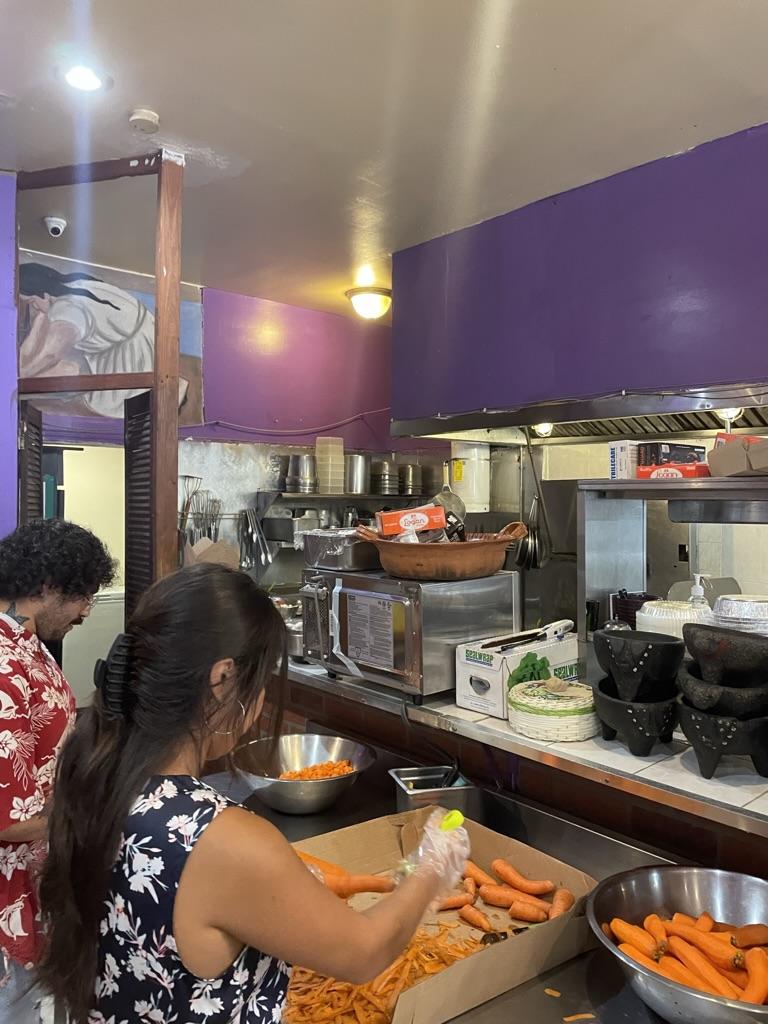Every morning, a large truck pulls up outside La Morada restaurant in Mott Haven and drops off boxes of fresh vegetables.
“We don’t even know his name,” laughed Natalia Saavedra, 53, co-owner and cook at La Morada restaurant. “But he comes by in a truck and drops off four boxes of carrots or potatoes.”
La Morada is known for its award-winning Oaxacan mole and immigrant activism, but few people know that half of their ingredients come from donations.
From bread and meat, to garlic and bell peppers – it all makes its way to La Morada’s doorstep daily from around 10 different organizations including recycled food organizations, food pantries, local farms, community gardens, and neighbors themselves.
“Some organizations have food and leftovers that will go bad. We bring them, wash them, and rescue the ones that are good,” said Saavedra, whose Oaxacan style dishes have won a Michelin star.
The “rescued” food is then washed and hand-picked for their Mexican style dishes.
The restaurant doubles as a mutual aid kitchen: a collaborative food exchange for the community’s benefit. It turns recycled ingredients into healthy meals for community residents.
Locals receive free meals from La Morada’s kitchen, which is located in one of the most food insecure districts in the state. Nearly 1 in 4 residents are unable to meet basic nutritional needs, compared to 14.6 percent citywide, according to Food America.
“The food that we eat is the food that we serve,” said Yajaira Saavedra, Natalia’s daughter, who manages the restaurant’s mutual aid kitchen.
At a Mutual Aid in the City of Asylum event at New York University on Sept. 14, she called it “food justice.”
“The same meal that we are eating, the person in the business suit is eating, and the migrant is eating,” she said.
La Morada has been around since 2009, but its mutual aid kitchen started in April 2020 during the COVID pandemic when Natalia used the restaurant’s excess ingredients from lockdown to make chicken soup for the community.
“The first day there were over 100 people and within 30 minutes — the soup was gone,” said Yajaira Saavedra. “The next day, the line just kept going.”
And it hasn’t stopped since.
In fact, it’s grown to encompass one-third of the restaurant’s customers, according to Marco Saavedra, Natalia’s son and long-time restaurant staffer, who said word of mouth helped food donations grow.
One of the organizations that donates to La Morada is Rethink Food, a New York based company that collects excess food from brands, hospitality groups, and grocers, and donates it to sustainable kitchens that help feed food insecure communities.
“Food upcycling,” is how Rethink describes it on their website. Upcycling refers to re-using a discarded object in a way that makes a product of higher quality or value than the original.
Other organizations that give food to La Morada include three upstate New York farms: the Stone Barns Center for Food and Agriculture in Pocantico Hills, Sky High Farm in Ancramville, and Sweet Freedom Farm in Germantown.
“We try to be mindful that local, organic food is just healthier. We are trying to provide people not just with food, but with nourishment,” said Marco Saavedra.
On a recent weekday, three volunteers from the Latino Medical Association at the Albert Einstein College of Medicine helped peel carrots and pack bread at La Morada.
“My experience at La Morada is so grounding,” said Lesly Diaz Chacha, 26, a medical student at the Einstein school and a volunteer at La Morada that day. “It reminds me to be present.”
They represent one of the many groups that stop by La Morada for a day of civic engagement. Other volunteers help pick bell peppers, squash, and broccoli from the local Bruckner- Mott Haven community garden at 678 East 136 St., which supplies fresh produce to community members for free.
Almost 3.9 million tons of food are thrown away each year in New York state, according to the New York State Energy Research and Development Authority. Almost 68% of the food discarded is still edible, according to a 2017 study by the Natural Resource Defense Council in New York City.
In 2021 the city implemented its first 10-year food policy plan Food Forward NYC to reach a more equitable, sustainable and healthy food system. The plan aims for the city to collect 90% of its organic waste by 2030 as a way to combat food insecurity through shared kitchens.
During the pandemic, multiple groups with kitchens partnered with food donors to deliver fresh, free food to community fridges and resident homes. During the pandemic, La Morada donated up to 600 meals a day to the Mott Haven community fridge.
La Morada is redesigning the food chain in the Bronx and greater New York State, and they are not doing it alone.
“So if you want to be part of the cool kids, come join us,” Yajaira Saavedra said.

